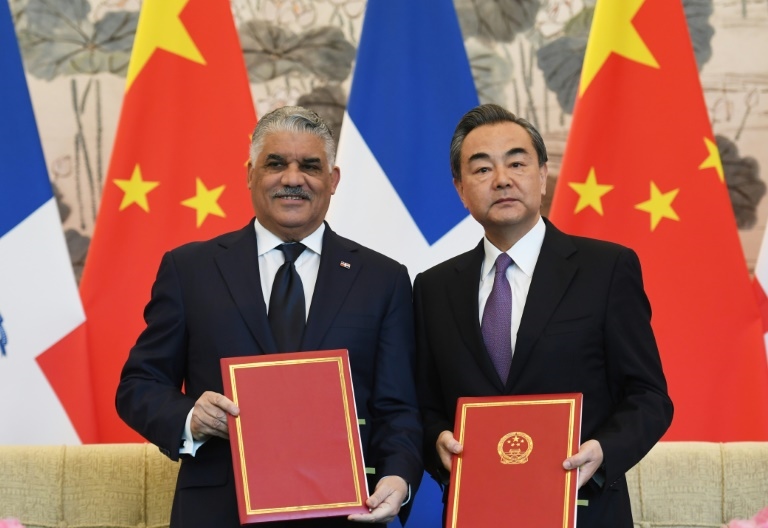Taiwan loses another ally
May 1, 2018 | Expert Insights

The Dominican Republic has broken its ties with Taiwan, in favour of China. Last year, Panama also severed relations with Taipei. Since the pro-independence Democratic Progressive Party came into power in 2016, Taiwan-China ties have been strained, with Beijing increasing its presence in Taiwanese waters.
Background
The island nation of Taiwan is a highly contested region in East Asia. It is located north of the Philippines, off the south-eastern coast of China. While Taiwan is considered a province in “Greater China,” it is largely an independent state. This ambiguity can be traced back to 1927, when the seeds were sown for a civil war between Kuomintang (KMT)-led government of the Republic of China, and the Communist Party of China (CPC). Both parties wrestled for control of China. While the civil war lasted between 1927 and 1950, the main phase is considered to be from 1945 to 1949.
The war came to an end when CCP captured Beijing. The leader of CCP, Mao Zedong, then officially declared the formation of People’s Republic of China. The leader of the opposing faction, Jiang Jieshi and fled to Taiwan with his 2 million followers. It is here that he declared the formation of Republic of China (ROC). PRC has repeatedly used the threat of force to ensure Taiwan (ROC) never declared independence. As far as mainland China is considered, Taiwan is a rebel force within China.
Despite the controversy that surrounds Taiwan, the region itself is economically robust and is one of the biggest traders in Asia. It is a leader in the field of computer technology. Taiwan held legislative elections in 1992, and its first direct presidential election in 1996. Since 2000, the country has experienced peaceful and democratic transfers of power. Taiwan has a democratically elected President, laws and its own armed forces.
Chinese President Xi Jinping has been firm on his “One China” rhetoric, and repeatedly warned against separatism. During the national party congress, Jinping said that China would “Absolutely not tolerate the tragedy of the country’s split.” He issued a specific warning to Taiwan, stating that China had “a firm will, sufficient faith, and adequate capacity to defeat any intention of ‘Taiwan independence’ in any form.” Taiwan-China ties have been strained in recent months. China has increased its military presence in Taiwan’s neighbourhood, conducting live-fire drills and flying close to Taiwanese airspace. The current Taiwanese administration, led by Tsai Ing-wen, is pro-independence. Studies show that most Taiwan residents do not consider themselves Chinese.
Read more on these escalating tensions here.
Analysis
Taiwan has now lost an important ally to China. The Dominican Republic has ended its ties with Taiwan and recognised Taiwan as "an inalienable part of the Chinese territory". Taiwan has accused China of using “dollar diplomacy to convert Taiwan’s diplomatic allies.” Taiwanese officials claimed that China offered the Dominican Republic $3.1 billion in investments and loans to change their stance on Taiwan. China is also one of the Dominican Republic’s largest trading partners.
Foreign Minister Joseph Wu added that these actions “served to drive a wedge between the people on both sides of the Taiwan Strait, erode mutual trust, and further harm the feelings of the people of Taiwan.” Taiwan also announced that it would be withdrawing its developmental assistance to the Dominican Republic.
William Stanton, one of the de facto US Ambassadors to Taiwan said that the incident “is not and has never been strategically significant”. However, it “contributes to Taiwan’s sense of isolation and growing fear of abandonment by the world”. Taiwan's most influential friend in world politics is the US. China has strongly criticised US-Taiwan ties, which have improved under the Trump administration, after the signing of the Taiwan Travel Act. The United States has reportedly been considering naval port calls to Taiwan. However, Washington adheres to the One China policy and does not have diplomatic ties with China.
Taiwan has not had formal diplomatic ties with a large proportion of the world’s countries since 1971, when the United Nations switched diplomatic recognition to Beijing's People's Republic of China. Taiwan’s formal allies have reduced from 30 in the 1990s, to 19. The Vatican is one of the few international figures that still recognises Taiwan, however, analysts believe that the Holy See may also soon also switch its diplomatic recognition to Beijing.
Taiwan maintains non-diplomatic, unofficial relations with the European Union and over 40 other states. This includes a majority of South-East Asian states, Australia, India, Japan, Russia, US, Israel, South Korea, and South Africa.
Assessment
Our assessment is that Beijing has been largely successful at isolating Taiwan on a global stage. Taiwan could find it difficult to compete with Beijing in garnering support from developing nations. Low-income nations may prefer to side with one of the world’s largest economies over Taipei. Additionally, Taiwan cannot rely entirely on the US for military aid. Washington may be unlikely to risk antagonising China to the extent of a full-blown war. As stated previously, we believe that Taiwan’s “re-unification” with China is an inalienable part of Xi Jinping’s vision for the country. In its attempts to politically isolate Taiwan, China may end up alienating Taiwanese citizens. The current situation has the potential to result in a deadlocked political crisis.








Comments